- Home
- Bill Bryson
I'm a Stranger Here Myself Page 7
I'm a Stranger Here Myself Read online
Page 7
I’ve looked for Quinntown several times as I’ve passed, but even with a good map the site is nearly impossible to find because the woods are so lacking in distinguishing landmarks. I know a man who has looked for Quinntown off and on for years and still not found it.
Last weekend I decided to try again. There was a fresh fall of snow, which always makes the woods agreeable. Naturally the thought flitted through my mind that I might stumble on some sign of the missing jet. I didn’t really expect to find anything—I was seven or eight miles from the presumed crash site reported in the local paper—but on the other hand, the plane has to be out there somewhere and it was altogether possible that no one had looked in this area.
So I went out in the woods and had a good tramp around. I got a lot of healthful fresh air and exercise, and the woods were stunning in their snowy softness. It was strange to think that in all that vast stillness there were the remains of a oncerobust little community, and stranger still that somewhere out there with me was a crumpled, unfound plane with two bodies aboard.
I would love to be able to tell you that I found Quinntown or the missing plane or both, but alas I did not. Sometimes life has inconclusive endings.
Columns, too, I’m afraid.
(Author’s note: On Christmas Eve 1998, as this book was being prepared for publication, the second anniversary of the plane’s disappearance passed without any new news on what might have become of it. One theory is that the men, searching for an open space, tried to land on a lake but broke through the thin ice and sank to the bottom; in the night the ice reformed and was covered in fresh snow by morning. Working on that assumption, the lakes in the vicinity were checked by divers and airborne metal detectors in the summer of 1997. The search turned up nothing but some old cars and abandoned refrigerators.)
I am assured that this is a true story.
A man calls up his computer helpline complaining that the cupholder on his personal computer has snapped off, and he wants to know how to get it fixed.
“Cupholder?” says the computer helpline person, puzzled. “I’m sorry, sir, but I’m confused. Did you buy this cupholder at a computer show or receive it as a special promotion?”
“No, it came as part of the standard equipment on my computer.”
“But our computers don’t come with cupholders.”
“Well, pardon me, friend, but they do,” says the man a little hotly. “I’m looking at mine right now. You push a button on the base of the unit and it slides right out.”
The man, it transpired, had been using the CD drawer on his computer to hold his coffee cup.
I bring this up here by way of introducing our topic this week: cupholders. Cupholders are taking over the world.
It would be almost impossible to exaggerate the importance of cupholders in automotive circles these days. The New York Times recently ran a long article in which it tested a dozen family cars. It rated each of them for ten important features, among them engine size, trunk space, handling, quality of suspension, and, yes, number of cupholders. A car dealer acquaintance of ours tells us that they are one of the first things people remark on, ask about, or play with when they come to look at a car. People buy cars on the basis of cupholders. Nearly all car advertisements note the number of cupholders prominently in the text.
Some cars, like the newest model of the Dodge Caravan, come with as many as seventeen cupholders. The largest Caravan holds seven passengers. Now you don’t have to be a nuclear physicist, or even wide awake, to work out that that is 2.43 cupholders per passenger. Why, you may reasonably wonder, would each passenger in a vehicle need 2.43 cupholders? Good question.
Americans, it is true, consume positively staggering volumes of fluids. One of our local gas stations, I am reliably informed, sells a flavored confection called a Slurpee in containers up to 60 ounces in size. But even if every member of the family had a Slurpee and a personal bottle of Milk of Magnesia for dealing with the aftereffects, that would still leave three cupholders spare.
There is a long tradition of endowing the interiors of American cars with lots of gadgets and comforts, and I suppose a superfluity of cupholders is just an outgrowth of that tradition.
The reason Americans want a lot of comfort in their cars is because they live in them. Almost 94 percent of all American trips from home involve the use of a car. People in America don’t just use their cars to get to the shops but also to get between shops. Most businesses in America have their own parking lots, so someone running six errands will generally move the car six times on a single outing, even to get between two places on opposite sides of the same street.
There are two hundred million cars in the United States— 40 percent of the world’s total, for about 5 percent of its population—and an additional two million new ones hit the roads each month (though obviously many are also retired). Even so, there are about twice as many cars in America as there were twenty years ago, driving on twice as many roads, racking up about twice as many miles.
So, because Americans have a lot of cars and spend a lot of time in them, they like a lot of comforts. However, there is a limit to how many different features you can fit into a car interior. What better, then, than to festoon it with a range of nifty cupholders, particularly when people seem to go for them in a big way? That’s my theory.
What is certainly true is that not putting cupholders in a car is a serious mistake. I read a couple of years ago that Volvo had to redesign all its cars for the American market for this very reason. Volvo’s engineers had foolishly thought that what buyers were looking for was a reliable engine, side-impact bars, and heated seats, when in fact what they craved was little trays into which they could insert their Slurpees. So a bunch of guys named Nils Nilsson and Lars Larsson were put to work designing cupholders into the system, and Volvo was thus saved from beverage ignominy, if not actual financial ruin.
Now from all the foregoing we can draw one important conclusion—that no matter how hard you try, it is not quite possible to fill a column space with a discussion just of cupholders.
So let me tell you how I happen to know that those fellows at Volvo were called Nils Nilsson and Lars Larsson.
Some years ago when I was in Stockholm and had nothing better to do one evening (it was after 8 P.M., long after all the locals had turned in for the night), I passed the hours before bedtime thumbing through the local phone directory and tallying various names. I had heard that there were only a handful of surnames in Sweden, and this was essentially so. I counted over two thousand each for Eriksson, Svensson, Nilsson, and Larsson. Most of the rest of the book was taken up with Jonssons, Johanssens, and other similar variants. Indeed, there were so few names (or perhaps the Swedes were so cosmically dull) that many people used the same name twice. There were 212 people in Stockholm named Erik Eriksson, 117 named Sven Svensson, 126 named Nils Nilsson, and 259 named Lars Larsson. I wrote these figures down on a piece of paper and have been wondering all these years when I would ever find a use for it.
From this, I believe, we can draw two further conclusions. Save all scraps of paper bearing useless information, for one day you may be glad you did, and if you go to Stockholm, take drink. Now if you will excuse me, I am off for a Slurpee.
The other day I had an experience so startling and unexpected that it made me spill a soft drink down my shirt. (Though, having said that, I don’t actually need an unexpected event to achieve this. All I need is a soft drink.) What caused this fizzy outburst was that I called a government office—specifically, the U.S. Social Security Administration— and someone answered the phone.
There I was all poised to have a recorded voice tell me: “All our agents are busy, so please hold while we play you some irritating music interrupted at fifteen-second intervals by a recorded voice telling you all our agents are busy so please hold while we play you some irritating music” and so on until suppertime.
So imagine my surprise when, after just 270 rings, a real person came on th
e line. He asked some of my personal details and then said, “Excuse me, Bill. I have to put you on hold a minute.”
Did you catch that? He called me Bill. Not Mr. Bryson. Not Sir. Not O Mighty Taxpayer. But Bill. Two years ago, I would have regarded this as a small impertinence, but now I find I’ve grown to like it.
There are certain times when the informality and familiarity of American life strains my patience—when a waiter tells me his name is Bob and that he’ll be my server this evening, I still have to resist an impulse to say, “I just want a cheese-burger, Bob. I’m not looking for a relationship”—but mostly I have come to like it. It’s because it’s symbolic of something more fundamental, I suppose.
There is no tugging of forelocks here, you see, but a genuine universal assumption that no person is better than any other. I think that’s swell. My garbage collector calls me Bill. My doctor calls me Bill. My children’s school principal calls me Bill. They don’t tug for me. I don’t tug for them. I think that’s as it should be.
In England, I used the same accountant for over a decade, and our relations were always cordial but businesslike. She never called me anything but Mr. Bryson and I never called her anything but Mrs. Creswick. When I moved to America, I phoned an accountant for an appointment. When I came to his office, his first words to me were, “Ah, Bill, I’m glad you could make it.” We were pals already. Now when I see him I ask him about his kids.
It shows itself in other ways, too. Hanover, where we live, is a college town. The local university, Dartmouth, is a private school and quite exclusive, but you would never guess it. None of its grounds are off limits to us, unlike, say, Oxford or Cambridge in England where virtually all the college property is closed to outsiders even though those venerable institutions are actually public and owned by the nation. Just you try to go into the Bodleian Library and have a look around, or take a stroll through one of the college quads outside an extremely limited number of hours and see what happens.
Dartmouth, by splendid contrast, could hardly be more accommodating to the community. One of my daughters skates on the college ice rink. My son’s high school track team practices in the winter on the college’s indoor track. The Hopkins Center, a performing arts center, shows movies and puts on live productions to which the general public is welcomed. Just last night I saw North by Northwest on a big screen with one of my teenagers, and afterward we had coffee and cheese-cake in the student cafeteria. At none of these things do you ever have to show an ID or secure special permission, and never are you made to feel as if you are trespassing or unwelcome.
All this gives everyday encounters a sheen of openness and egalitarianism that I admire very much. It removes a lot of stuffiness from life. The one thing it won’t do, however, is get you your wife’s social security number when that number has been mislaid. We needed the number fairly urgently for some tax form. I explained this to the social security man when he came back on the line. He had, after all, just called me Bill, so I had reason to hope that we might get somewhere.
“I’m sorry,” he said, “but we are only permitted to divulge that information to the designated individual.”
“The person named on the card, you mean?”
“Correct.”
“But she’s my wife,” I sputtered.
“We are only permitted to divulge that information to the designated individual.”
“Let me get this straight,” I said. “If I were my wife, you would give me the number over the phone?”
“Correct.”
“But what if it was somebody just pretending to be her?”
A hesitant pause. “We would assume that the individual making the inquiry was the individual indicated as the designated individual.”
“Just a minute please.” I thought for a minute. My wife was out, so I couldn’t call on her, but obviously I didn’t want to have to go through all this again later. I came back on the phone and said in my normal voice: “Hello, it’s Cynthia Bryson here. Please could I have my card number?”
There was a nervous chuckle. “I know it’s you, Bill,” the voice said.
“No, honestly. It’s Cynthia Bryson. Please could I have my number?”
“I can’t do that.”
“Would it make a difference if I spoke in a female voice?”
“I’m afraid not.”
“Let me ask you this—just out of curiosity. Is my wife’s number on a computer screen in front of you right now?”
“Yes it is.”
“But you won’t tell me it?”
“I’m afraid I can’t do that, Bill,” he said, and sounded as if he meant it.
I have learned from years of experience that there is not the tiniest chance that a U.S. government employee will bend a rule, so I didn’t press the matter. Instead I asked him if he knew how to get strawberry pop stains out of a white T-shirt.
“Baking soda,” he replied without hesitation. “Leave it to soak overnight and it will come right out.”
I thanked him and we parted.
I would have liked it, of course, if I had managed to get the information I needed, but at least I had made a friend and he was right about the baking soda. The T-shirt came out like new.
I was intending this week to write about some exasperation or other of modern American life when Mrs. Bryson (who is, may I say, a dear woman) brought me a cup of coffee, read the first few lines off the computer screen, muttered, “Bitch, bitch, bitch,” and shuffled off.
“Pardon, my dewy English rose?” I called.
“You’re always complaining in that column.”
“But the world needs righting, my luscious, cherry-cheeked daughter of Boadicea,” I rejoined tranquilly. “Besides, complaining is what I do.”
“Complaining is all you do.”
Well, excuse me, but not quite. I believe on these very pages I once said a few words of praise for the American garbage disposal, and I clearly recall commending our local post office for providing me with a free doughnut on Customer Appreciation Day. But perhaps she had a point.
There are many wonderful things about the United States of America that deserve praise—the Bill of Rights, the Freedom of Information Act, and free refills are three that leap to mind—but none is more outstanding than the friendliness of the people.
When we moved to this little town in New Hampshire, people received us as if the one thing that had kept them from total happiness to this point was the absence of us in their lives. They brought us cakes and pies and bottles of wine. Not one of them said, “So you’re the people who paid a fortune for the Smith place,” which I believe is the traditional greeting in England. Our next-door neighbors, upon learning that we were intending to go out to eat, protested that it was too, too dreary to dine in a restaurant on one’s first night in a new town and insisted we come to them for dinner there and then, as if feeding six extra mouths was the most trifling of burdens.
When word got around that our furniture was on a containership making its way from Liverpool to Boston, evidently by way of Port Said, Mombasa, and the Galápagos Islands, and that we were temporarily without anything to sleep on, sit on, or eat from, a stream of friendly strangers (some of whom I have not seen since) began traipsing up the walk with chairs, lamps, tables, even a microwave oven.
It was dazzling, and it has remained so. At Christmas this year we went to England for ten days and returned home late at night and hungry to find that a neighbor had stocked the fridge with both essentials and goodies and filled vases with fresh flowers. This sort of thing happens all the time.
Recently I went with one of my children to a Dartmouth College basketball game. We arrived just before game time and joined a long line at one of the ticket windows. After a minute a man came up to me and said, “Are you waiting to buy tickets?”
“No, I’m standing here to make the line more impressive,” was the reply that leapt to mind, but of course all I said was, “Yes, I am.”
“Because you ca
n have these,” he said, and thrust two tickets at me.
My immediate thought, born of years of stupidly misreading situations, was that there must be some catch. “How much?” I said warily.
“No, no, you can have them. For free. We can’t go to the game, you see.” He indicated a car outside with the engine running and a woman in the passenger seat.
“Really?” I said. “Well, thank you very much.” And then I was struck by a thought. “Did you make a special trip here to give away two tickets?”
“They were going to go to waste otherwise,” he said apologetically. “Enjoy the game.”
Perhaps the most singular thing is that there is no crime here. I mean none. People will casually leave a $500 bicycle propped against a tree and go off to do their shopping. If someone did steal it, I am almost certain the victim would run after the thief shouting, “Could you please return it to 32 Wilson Avenue when you’ve finished with it? And watch out for the third gear—it sticks.”
No one locks anything. I remember being astounded by this on my first visit when a realtor took me out to look at houses and she kept leaving her car unlocked, even when we went into a restaurant for lunch and even though there was a mobile phone on the front seat and some shopping in the back.
At one of the houses, she discovered she had brought the wrong key. “Back door’ll be unlocked,” she announced confidently, and it was. I subsequently realized that there was nothing unusual in this. We know people who go away on vacation without locking their doors, don’t know where their house key is, aren’t even sure if they still have one.
Now you might reasonably wonder why, then, this is not a thief’s paradise. There are two reasons, I believe. First, there is no market for stolen goods here. If you sidled up to anyone in New Hampshire and said, “Want to buy a car stereo?” the person would look at you as if you were out of your mind and say, “No, I already have a car stereo.” Then they would report you to the police and—here is the second thing—the police would come and shoot you.

 Notes from a Small Island
Notes from a Small Island A Short History of Nearly Everything
A Short History of Nearly Everything A Walk in the Woods
A Walk in the Woods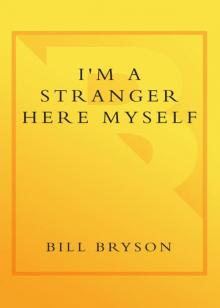 I'm a Stranger Here Myself
I'm a Stranger Here Myself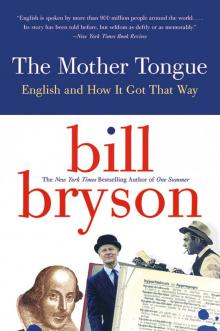 The Mother Tongue
The Mother Tongue Shakespeare
Shakespeare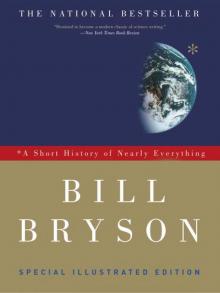 A Short History of Nearly Everything: Special Illustrated Edition
A Short History of Nearly Everything: Special Illustrated Edition The Best American Travel Writing 2016
The Best American Travel Writing 2016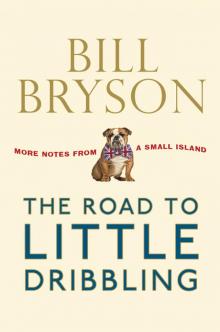 The Road to Little Dribbling
The Road to Little Dribbling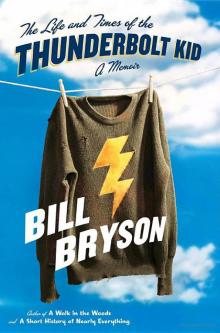 The Life And Times Of The Thunderbolt Kid: A Memoir (v5.0)
The Life And Times Of The Thunderbolt Kid: A Memoir (v5.0) Made In America
Made In America Seeing Further
Seeing Further Shakespeare: The World as Stage
Shakespeare: The World as Stage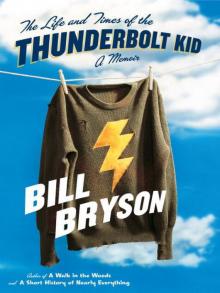 The Life and Times of the Thunderbolt Kid
The Life and Times of the Thunderbolt Kid At Home
At Home Bryson's Dictionary For Writers And Editors (v5.0)
Bryson's Dictionary For Writers And Editors (v5.0) Neither Here Nor There
Neither Here Nor There Bill Bryson's African Diary
Bill Bryson's African Diary